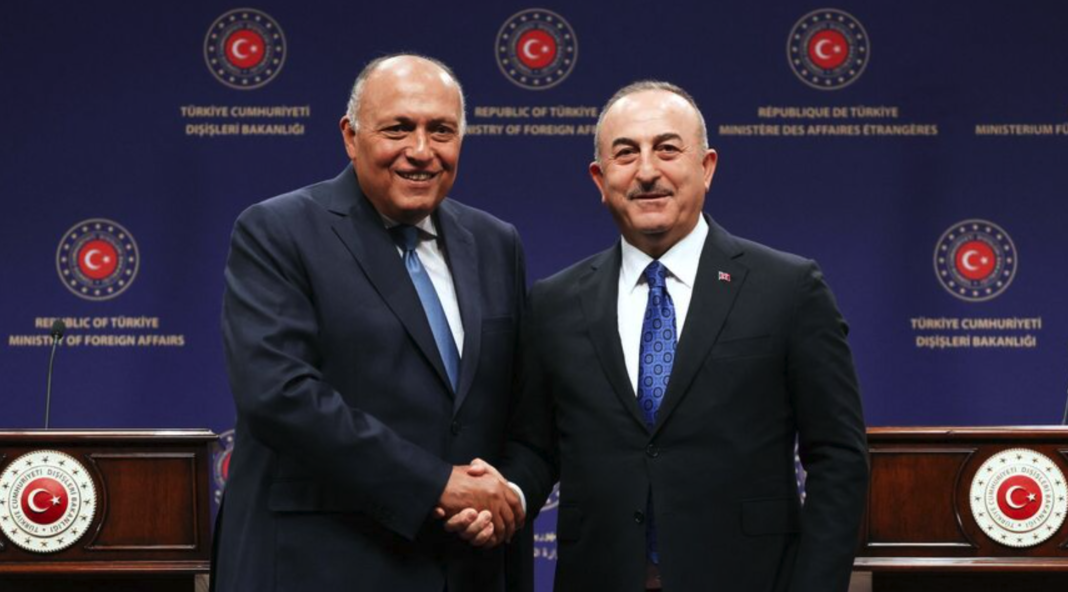The former Eastern Mediterranean rivals are on the path to rapprochement, but there are no plans for the return of ambassadors as of yet. By Andrew Wilks in Al-Monitor on April 13, 2023.
Egypt’s chief diplomat arrived in Turkey on Thursday in the latest step to restore frayed ties that have seen the countries at odds for more than a decade.
Foreign Minister Sameh Shoukry touched down in Ankara for talks with his counterpart, Mevlut Cavusoglu, less than a month after the Turkish minister traveled to Cairo, the first visit by a Turkish foreign minister to the Arab world’s most populous nation in 11 years.
Cavusoglu had raised the prospect of the reappointment of ambassadors between the countries during his Egypt visit, stoking expectations that such a move would be announced during Shoukry’s reciprocal trip.
The ministers, however, only reiterated that the process and timeline for the full restoration of diplomatic ties was being worked on. Ambassador-level relations between the two countries ended in late 2013.
“We are going to set a time to announce this important step, in addition to a [presidential] summit to be held,” Shoukry told a joint news conference in Ankara. “All these details and times will be agreed upon with my colleague.”
The East Mediterranean powers have been at loggerheads since the Egyptian military overthrew President Mohammed Morsi in 2013 amid mass protests against his yearlong rule.
Morsi’s Muslim Brotherhood was supported by Turkey as Ankara backed Islamist groups in the wake of the 2011 Arab Spring. Egypt has designated the group a terrorist organization.
During his visit to Cairo in March, Cavusoglu suggested the possibility of an official meeting between Turkish President Recep Tayyip Erdogan and President Abdel Fattah al-Sisi of Egypt after Turkey’s May elections.
The leaders met briefly during the World Cup in Qatar in November and were photographed shaking hands.
But just four years ago, following executions in Egypt, Erdogan said of Sisi: “I will never talk to someone like him.” He also criticized Western countries that “roll out the red carpet” for the Egyptian president and turn a blind eye to human rights abuses.
Instead of announcing any further developments on a presidential meeting, the foreign ministers focused on improving economic links and fostering stability in the region.
“We want to fill the new page we opened with Egypt with joint projects and success stories,” Cavusoglu said.
He added, “This momentum we have in our bilateral relations will be further accelerated through concrete steps. We need more concrete steps, and we’re in talks about that — and we need to convene more frequently.
“As two important countries of the Mediterranean and Islamic geography, our cooperation is particularly important for regional matters, for the stability of the region. That’s why we will be working in closer cooperation from today.”
Syria and Libya were two areas where the ministers said they would work to bring peace and security.
Turkey has now abandoned its critical approach toward Sisi, who as defense minister led the overthrow of Morsi. Ankara has also repaired ties with Saudi Arabia, the United Arab Emirates and Israel as it seeks to reset regional relations and secure trade and finance to aid its beleaguered economy.
As well as the ousting of Morsi, Turkey and Egypt also clashed over Libya, where they back opposing sides. Three years ago, tensions nearly led to direct conflict between the two during the attack on the Libyan capital, Tripoli, by eastern-based commander Khalifa Hifter, who is backed by Egypt.
Cairo was also angered by a 2019 deal between Turkey and Libya’s UN-recognized government in Tripoli that sought to boost Turkish maritime rights and influence in the Eastern Mediterranean. Egypt and Greece responded by signing a separate agreement to delineate their maritime boundaries, a deal that Ankara rejected.
Turkey’s tolerance of Muslim Brotherhood members operating within its borders seems to have waned since it began wooing Sisi.
Egyptian opposition channels based in Istanbul have been asked to soften their criticism of Sisi’s government, and several Egyptian journalists have left Turkey. Last year, opposition TV channel Mekameleen shut down its Turkey offices.
Erdogan, meanwhile, continues to use the four-fingered Rabia gesture associated with Muslim Brotherhood protesters, although he says it also has a domestic meaning, signifying nation, flag, homeland and state.
The path to rapprochement has been eased by the 2021 agreement to end the Gulf Cooperation Council’s dispute with Qatar, which had seen Egypt, Saudi Arabia, the UAE and Bahrain blockade Turkey’s ally.
Meanwhile, US President Joe Biden signaled a reduced American role in the Middle East, leading countries in the region to look to each other for support.
The devastation caused by February’s earthquakes in southern Turkey, which are estimated to cost $104 billion, and Egypt’s own economic crisis have also placed an onus on repatching relations.
Disaster diplomacy — Shoukry visited the earthquake zone in late February — has revived efforts to resume mutually beneficial ties.
Egypt is Turkey’s biggest trade partner in North Africa, with bilateral trade passing $5 billion in 2018 despite the countries’ antipathy. Cavusoglu said Tuesday that trade levels had now reached $10 billion — with Turkey importing more Egyptian natural gas than any other market — and declared the aim of raising it to $15 billion.

